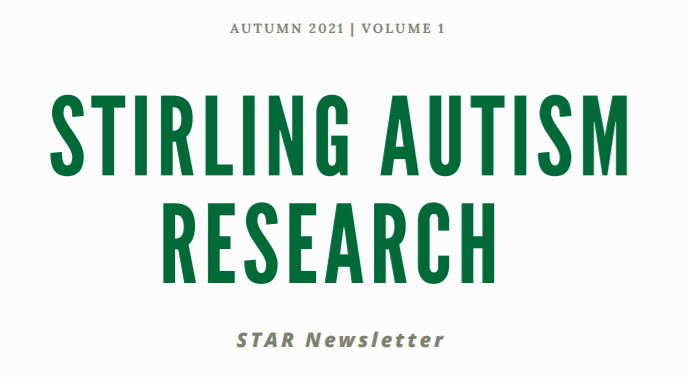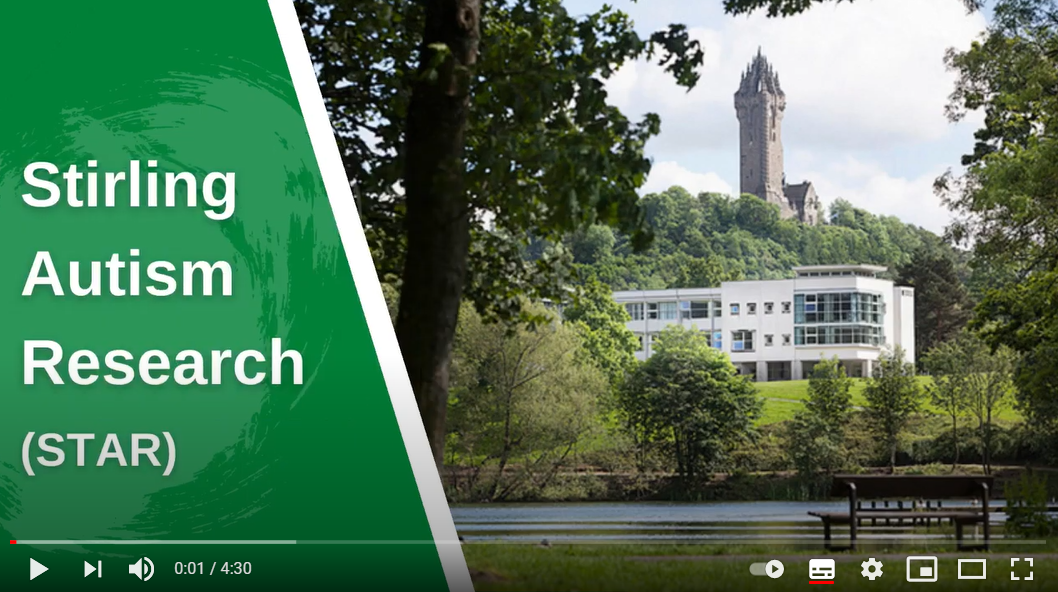Home » Articles posted by eilidhcage (Page 2)
Author Archives: eilidhcage
Affiliated and former members
Professor Peter Hancock is principally interested in the perception of faces and what kind of representations we might use. His research has explored face processing and scene perception in autistic individuals and those with Williams syndrome. Read more about Peter’s research and publications here.
The first STAR newsletter!
We are excited to share our first STAR newsletter! Our plan is to have regular newsletters (every few months) which update you on what we have been doing. In this first ever STAR newsletter, we’ve got a lot to cover! Find out about our recent research, our busy conference season, and what we’ve got planned for the future of STAR. If you’ve got any feedback on our newsletter, please email us at autismresearch@stir.ac.uk. Click below to download our newsletter, and we hope you enjoy it!
New video series about our research!
We have recently launched our new video series which aims to explain our research projects in less than five minutes! Our first video discusses Dr Eilidh Cage’s recent paper with collaborators from Royal Holloway and UCL on camouflaging and stigma. You can watch the video on YouTube below:
This video was created by Lauren Paterson, a MSc placement student. We’ll be sharing more of our videos each month, so stay tuned for more! And, if you have any feedback about our videos, please email us at autismresearch@stir.ac.uk
Reflections on a STAR Placement
Recently, Lauren Paterson completed a 10-week placement with STAR as part of her MSc at the University of Stirling. While many of our placement students assist with our research projects, this year we tried a new placement which involved supporting the STAR team with our social media and public engagement activities – something we want to do lots more of! In this blog, Lauren reflects on her time with STAR.
My name is Lauren Paterson, and I am a student at the University of Stirling undertaking a Psychology (Conversion) MSc course. This course stood out amongst others due to the placement opportunity it provided, as it was important for me to gain practical skills and knowledge within Psychology and make an impact. I sought and secured a placement with Stirling Autism Research, as a Communications Assistant, beginning my placement in April.
While I had witnessed the strengths and challenges for an autistic family member throughout their education and into employment, I had no knowledge of what constituted autism research and community issues before I started this placement. What immediately struck me as I began my placement was my lack of awareness of basic autism knowledge and terminology, such as the general preference for identity-first language. Although I was very new to autism research when I started this placement, I was pleased to find that many autism research articles catered to non-experts, providing lay overviews below the abstract. While I found most articles to be accessible, at times I was overwhelmed by the contentious nature of topics spanning terminology to autism research conventions. Grasping these divisive topics was a steep learning curve, however, I was grateful to have been exposed to these controversies that I would have been otherwise ignorant to, and became passionate about spreading awareness and being a more effective supporter of autistic people.
As a Communications Assistant at STAR, I worked alongside Dr Eilidh Cage developing Twitter schedules, blog posts and YouTube videos. Over my 10-week placement, we were able to increase traffic across STAR social media accounts, and I am happy with the progress we have made and especially proud to have created accessible content that can hopefully reach many different people, through our series of digestible video summaries of STAR research articles. You can check out the first video I made here, and more will be released on the STAR YouTube channel in the months to come!
I am very grateful for the support of Dr Eilidh Cage and Dr Monique Botha throughout this placement, I have learnt so much that I can take with me and apply in the future. I will be very sad to leave STAR however, I am proud to played a small part in the important work they do in order to foster a more inclusive and accepting society for neurodivergent people.
Leverhulme Early Career Fellowship awarded to Dr Monique Botha
We are delighted to announce that Dr Monique Botha has been awarded an Early Career Fellowship from the Leverhulme Trust. The Fellowship will enable Monique to work on a significant piece of work for three years (starting later this year) at Stirling. The research project is called “Fragile Knowledge: Dehumanisation & Interpretation Bias in Autism Research”. Monique plans to investigate the role autism researchers play in the construction of autism knowledge. The project will use both textual analysis of existing literature, and experiments with autism researchers. Currently, there are many issues in autism research, such as the dehumanisation of autistic people, and Monique’s project will be one of the first to systematically examine these issues. The Fellowship will also give Monique the opportunity to foster collaborations and visit other researchers around the world (hopefully!). The project will have wide-reaching implications for ethical practices in autism research, and psychology as a discipline more broadly. Congratulations, Monique!
2022 STAR Placements and Research Assistants
We are extremely grateful for the support provided to the STAR team by placement students or voluntary research assistants! This year we are supported by:
Emily Greenan
Jen Dow
Lynsey McDevitt
Sanna Rehman
Sarah Dantas






